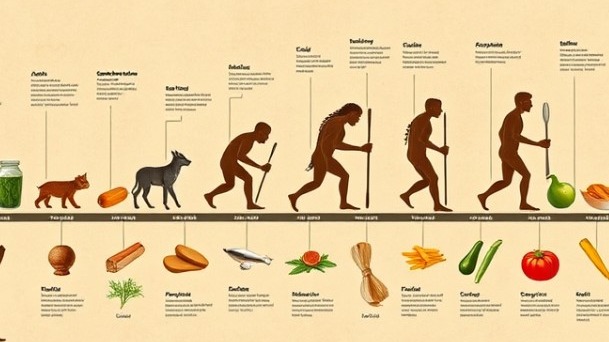
The Evolutionary Leap: How a Gene Variant Shaped Modern Humans
From towering heights to a bustling metabolism, two traits distinctly set modern humans apart from their non-human primate relatives. Recent research published in Cell Press unveils a groundbreaking discovery: a genetic variant that significantly influenced the co-evolution of increased stature and basal metabolic rate as dietary habits transitioned from meat-based to a vegetable-rich diet.
The Role of Meat in Human Growth
Researchers from Fudan University emphasize that the shift toward a meat-enhanced diet marks a pivotal moment in human evolution, affecting numerous physical traits. Co-corresponding authors Jin Li and He Huang underscore that as our ancestors became more carnivorous, it spurred developments in height, an important feature associated with natural selection.
The team utilized the UK Biobank, the largest genetic database, to establish correlations between specific genetic variants and physical characteristics. After sifting through approximately 6,000 potential variants, they identified the rs34590044-A allele, a regulatory variant of the ACSF3 gene, as particularly impactful in promoting growth when meat consumption is high.
The Science Behind the Variant
ACSF3 serves a critical role in gene expression, especially in the liver. Functional analyses reveal that this variant elevates ACSF3 levels, a fact that may elucidate its connection to metabolism and overall growth. Raised levels of ACSF3 not only enhance metabolic processes but also contribute to bone density, thus promoting greater height.
In experiments with mice nourished on amino acids that mirror a meat diet, those where ACSF3 was overexpressed exhibited both increased body length and heightened metabolic rates, reflecting potential implications for human dietary patterns.
Understanding Our Evolutionary Journey
This research offers remarkable insights into the intricate interplay between genetics and dietary habits, aiming to clarify how modern humans have developed adaptations distinct from their primate ancestors. As we advance in our understanding, combining genomics with ancient DNA studies could paint a complete picture of human evolution and adaptation.
Implications for a Healthy Lifestyle
Beyond understanding our evolutionary past, this research holds promise for current health and wellness. Awareness of how our genes interact with dietary practices enriches our perspective on nutrition and metabolism, which remains essential in modern health discussions.
In light of contemporary lifestyle habits, integrating protein-focused dietary choices has ongoing implications for wellness today. The importance of nutrition in achieving whole-body health cannot be overstated; incorporating immune-boosting foods from natural sources supports the benefits observed in research.
As we delve deeper into our genetic makeup, we uncover pivotal factors that contribute to a balanced diet. Adopting a holistic wellness approach, which includes understanding the genes that shape our physiological responses, will empower individuals to foster a healthier lifestyle.
With advancements in genetic research, we can tackle modern health issues through informed dietary choices that align with our evolutionary heritage. Integrating protein-rich foods into daily routines, alongside plant-based nutrition, creates a balanced dietary plan vital for energy and longevity.
Conclusion: Embrace Evolution for Better Health
As we glean insights from our genetic history, it's apparent that today's health decisions reverberate from our evolutionary past. Engaging in healthy lifestyle habits—whether through enhanced nutritional choices or understanding the historical implications of our genetics—can forge a path to improved well-being.
Explore these connections and consider how understanding your own dietary habits can pave the way for a healthier you. Commit to small, impactful changes in your daily wellness routine and reap the benefits of a well-informed, healthy lifestyle.
 Add Element
Add Element  Add Row
Add Row 



 Add Row
Add Row  Add
Add 


Write A Comment